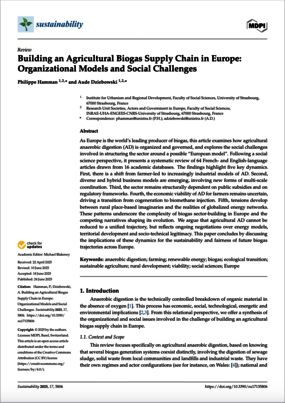Abstract
As Europe is the world’s leading producer of biogas, this article examines how agricultural anaerobic digestion (AD) is organized and governed, and explores the social challenges involved in structuring the sector around a possible “European model”. Following a social science perspective, it presents a systematic review of 64 French- and English-language articles drawn from 16 academic databases. The findings highlight five key dynamics. First, there is a shift from farmer-led to increasingly industrial models of AD. Second, diverse and hybrid business models are emerging, involving new forms of multi-scale coordination. Third, the sector remains structurally dependent on public subsidies and on regulatory frameworks. Fourth, the economic viability of AD for farmers remains uncertain, driving a transition from cogeneration to biomethane injection. Fifth, tensions develop between rural place-based imaginaries and the realities of globalized energy networks. These patterns underscore the complexity of biogas sector-building in Europe and the competing narratives shaping its evolution. We argue that agricultural AD cannot be reduced to a unified trajectory, but reflects ongoing negotiations over energy models, territorial development and socio-technical legitimacy. This paper concludes by discussing the implications of these dynamics for the sustainability and fairness of future biogas trajectories across Europe.
Keywords
anaerobic digestion; farming; renewable energy; biogas; ecological transition; sustainable agriculture; rural development; viability; social sciences; Europe
Published in Sustainability, Sustainable Agriculture thematic section, Review, Special issue Sustaining Growth: Balancing Economic, Social, and Environmental Concerns in Rural and Agricultural Development, vol. 17, n° 13, art. 5806, 2025, p. 1-28



